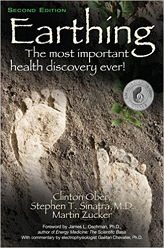Earthing - Questions and Answers with Dr. Stephen Sinatra Part 2

Earthing: The Most Important Health Discovery Ever?
Questions and Answers with Dr. Stephen Sinatra, M.D., F.A.C.C.
Cardiologist Stephen Sinatra's fascinating series of articles on Earthing ( read all five parts here ) has triggered many questions from readers. Dr. Sinatra answers some of them here, and will do so again. His book is Earthing:The Most Important Health Discovery Ever?
Question: Is the total body area that is grounded important or would standing for an hour on the sand at the beach be the same as lying on the sand for an hour?
Answer: The more exposure to the Earth's energy, in terms of surface volume, the faster the body becomes fully suffused with free electrons. However, I am talking in terms of seconds, or even less.
Walking on the wet sand along the surf will be a more conductive experience, as far as Earthing is concerned, than laying directly on dry, hot sand. Moist is better than dry. Laying on a towel will be effective, but only if a part of the body, such as the foot, comes in contact with the sand.
Of greater importance is Earthing on a regular basis, not just an occasional sun session on the sand or walking barefoot in a grassy park. You may get a pick-me-up from those brief interludes; however, sleeping or working regularly while grounded is how you will experience the real and sustained benefits.
Question: Can you get the Earthing effect from standing on concrete?
Answer: Yes. Concrete is made from water and minerals. Concrete is conductive, as long as the surface is not sealed. Asphalt, wood, vinyl and plastic are not conductive surfaces. Grass, dirt, sand, gravel, and stone floors are conductive.
Question: Would being in a concrete swimming pool be considered time spent Earthed?
Answer: Yes, if it is a concrete pool built into the Earth. The minerals in the water will conduct the Earth's energy. Better yet is the mineral-rich ocean.
Question: Can you experience benefits from Earthing once per week or less or does it have to be done every day?
Answer: You want to be grounded as much and as regularly as possible. Once a week will make you feel better for a little while after you do it. If you can sleep grounded and/or work grounded on a regular and continuing basis, our studies show there are a multitude of benefits.
Question: How long should you be grounded at a time? Would walking barefoot along the sea shore or on grass for 30 minutes do any good?
Answer: Sure. You will often feel energy and perhaps even pain relief. I tell people who don't believe me about Earthing to go outside and stand or sit barefooted, with feet on grass or concrete or dirt. Do it for a half-hour or 40 minutes. If they have a headache or some pain in the body, the discomfort or pain will typically come down a few notches and maybe even disappear. And they will feel calmer.
Question: Can Earthing cause problems if you are taking blood thinners like Coumadin, or aspirin, or even fish oil?
Answer: Coumadin (warfarin) is a prescription anticoagulant. Earthing appears to be a natural blood thinner. Given Earthing's positive effects on blood viscosity, it's best to proceed with caution if you're taking medication-especially when it comes to Coumadin, a potent blood thinner widely used by doctors for patients with cardiovascular conditions.
Patients on warfarin need regular blood viscosity tests (called INR), and doctors adjust dosing based on those results. If you are taking medication, particularly warfarin, you should first inform your doctor about Earthing. Then, together carefully monitor your body for side effects that indicate the dose is too high, and have your doctor adjust your dose accordingly.
You obviously don't want too much blood thinning so as not to increase the risk of bleeding. Doctors probably will not be familiar with Earthing and may suggest that a patient not do it while on the Coumadin.
If patients decide that they still want to experience the benefits of Earthing, my advice is to be sure to monitor INR more frequently so that if the INR goes too high, the doctor can adjust the dosage of medication. In this situation it is a good idea to start Earthing slowly, maybe a few hours in the beginning, and then gradually increasing the duration. I've written about this subject at www.earthinginstitute.net/index.php/blog
Question: Is Earthing dangerous if you have a pacemaker fitted?
Answer: Not any more than standing or walking barefoot on the Earth.
Question: Are there any measurable tests that can be done in the home before and after Earthing that might show a difference?
Answer: Go by how you feel. Most people feel better, have less pain or less stress, after grounding.
Earthing - Questions and Answers with Dr. Stephen Sinatra Part 1
July 2010
Stephen Sinatra, MD, FACC, FACN, CNS, is a board-certified cardiologist and certified bioenergetic analyst with more than 35 years of experience in helping patients prevent and reverse heart disease. His specialty is integrative cardiology that combines conventional medical treatments with complementary nutritional and psychological therapies.
Now retired, Dr. Sinatra lectures widely on the metabolic approach to cardiovascular disease and electromedicine.
Note: Complimentary Earthing books and products were provided for evaluation purposes as part of the Q and A with Dr Sinatra.





